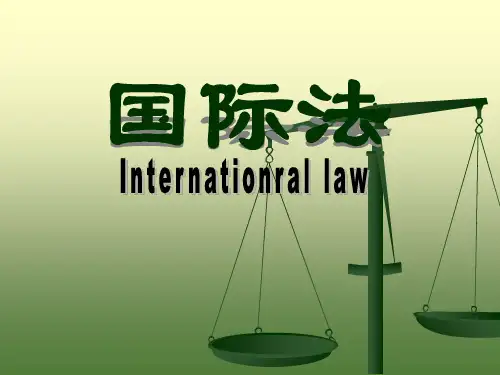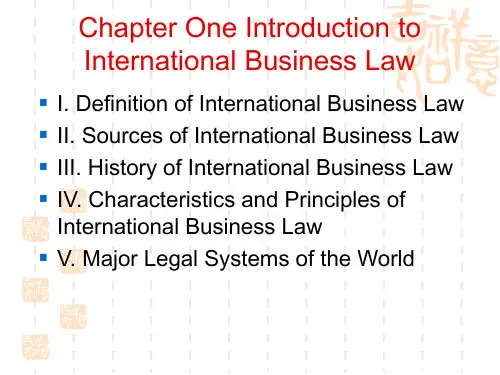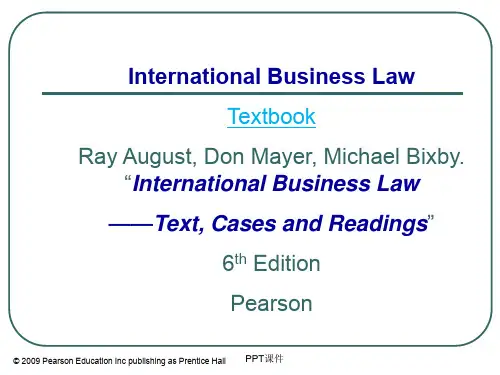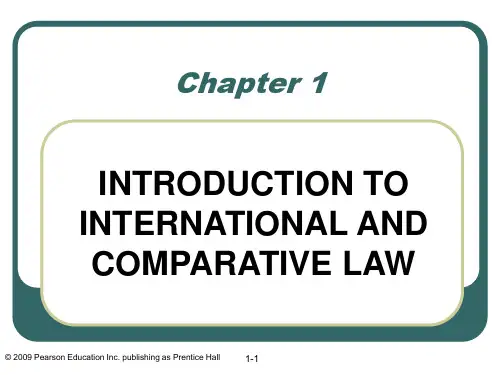国际商法课件第一章合同法(英文版)
- 格式:ppt
- 大小:76.00 KB
- 文档页数:32


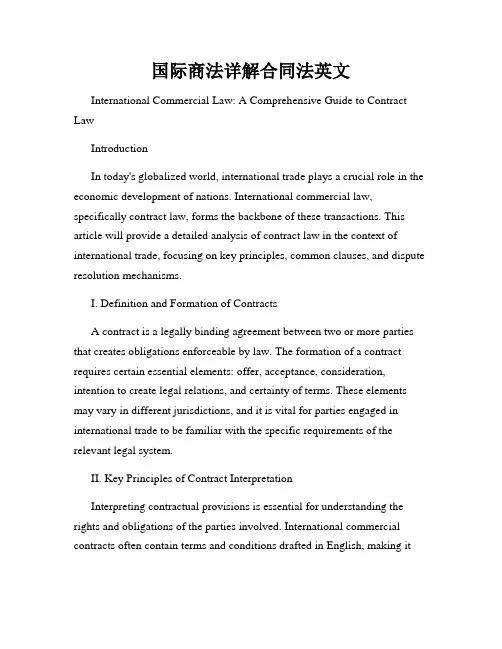
国际商法详解合同法英文International Commercial Law: A Comprehensive Guide to Contract LawIntroductionIn today's globalized world, international trade plays a crucial role in the economic development of nations. International commercial law, specifically contract law, forms the backbone of these transactions. This article will provide a detailed analysis of contract law in the context of international trade, focusing on key principles, common clauses, and dispute resolution mechanisms.I. Definition and Formation of ContractsA contract is a legally binding agreement between two or more parties that creates obligations enforceable by law. The formation of a contract requires certain essential elements: offer, acceptance, consideration, intention to create legal relations, and certainty of terms. These elements may vary in different jurisdictions, and it is vital for parties engaged in international trade to be familiar with the specific requirements of the relevant legal system.II. Key Principles of Contract InterpretationInterpreting contractual provisions is essential for understanding the rights and obligations of the parties involved. International commercial contracts often contain terms and conditions drafted in English, making itnecessary to interpret these provisions accurately. The following principles aid in the interpretation process:1. Literal Rule: The courts prioritize the plain and ordinary meaning of the contract's words and clauses. This approach assumes that parties intend their words to be interpreted according to their usual and natural meaning.2. Context Rule: Contractual provisions must be interpreted in light of the entire agreement. This principle ensures that each clause is read in relation to other clauses, promoting consistency and coherence within the contract.3. Contra Proferentem Rule: When contractual terms are ambiguous or unclear, any ambiguity is interpreted against the party who drafted the clause. This rule encourages parties to draft clear and unambiguous terms, avoiding potential disputes.III. Common Clauses in International Contracts1. Choice of Law Clause: This clause determines the governing law of the contract. Parties may choose a specific national law or opt for international conventions such as the United Nations Convention on Contracts for the International Sale of Goods (CISG).2. Force Majeure Clause: This clause addresses unforeseen events or circumstances that may prevent the performance of contractual obligations. Force majeure events typically include acts of God, war, natural disasters, or government interventions.3. Arbitration Clause: Parties often include an arbitration clause to outline the procedure for resolving disputes. Arbitration provides a neutralforum and offers advantages such as confidentiality, flexibility, and the ability to enforce awards in multiple jurisdictions.IV. Dispute Resolution MechanismsResolving disputes arising from international contracts can be complex, given the involvement of multiple jurisdictions. The following mechanisms are commonly used:1. Litigation: Parties may opt for litigation in national courts if their contract contains a choice of forum clause. Each party presents its case before a judge or jury, and the court issues a binding decision.2. Arbitration: As mentioned earlier, arbitration provides an alternative to litigation. Parties select an arbitrator or a panel of arbitrators who hear the case and issue a binding decision called an arbitral award.3. Mediation: Mediation involves a neutral third party assisting the parties in reaching a mutually agreeable settlement. The mediator does not issue a decision but facilitates communication and negotiation between the parties.ConclusionContract law is the cornerstone of international commercial transactions, ensuring stability and certainty in business relationships. Understanding the key principles of contract formation, interpretation, and dispute resolution is vital for businesses engaged in international trade. By incorporating well-drafted contractual clauses and selecting an appropriate dispute resolution mechanism, parties can mitigate risks and safeguard their interests effectively.。

